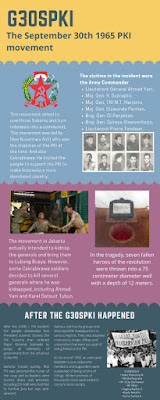History Text
G30SPKI
Late in the evening on Sept. 30, 1965, a group of army conspirators calling itself the September 30th Movement gathered in Jakarta with the aim of kidnapping and killing seven army generals in the early hours of the following morning. By dawn on Oct. 1, six of the generals were dead; the seventh, Abdul Nasution, had escaped. Later that morning the movement announced that it had seized power to forestall a coup against the president by a council of generals. In the meantime, General Suharto, commander of the army’s strategic reserve, began to gather the reins of power into his own hands. By evening he had seized the initiative from the conspirators.
The Indonesian Communist Party (Partai Komunis Indonesia; PKI) maintained that the coup attempt was an internal affair of the army. The army leadership, on the contrary, insisted that it was part of a PKI plot to seize power and subsequently embarked on a mission to purge the country of the perceived communist threat. In the following month the military slaughtered communists and alleged communists across Java and in Bali; estimates of the number of people killed ranged from 80,000 to more than 1,000,000. In the following years communists, alleged communists, and their families were frequently denied basic rights (e.g., the right to a fair trial, the right to equal opportunity in employment, and freedom from discrimination). Between 1969 and 1980, approximately 10,000 persons, primarily known or purported communists, were detained without trial on the island of Buru in the Moluccas.
With the destruction of the PKI, one of the elements of balance that had supported the Sukarno regime was eliminated, and the president himself came under increasing pressure. In March 1966, against a background of student action, the army forced Sukarno to delegate extensive powers to Suharto, now chief of staff of the army. With his new authority, Suharto banned the PKI and moved gradually to consolidate his position as the effective head of government. In March 1967 the Indonesian legislature installed Suharto as acting president, and in March 1968 he was appointed to the presidency in his own right. Sukarno was kept under house arrest until his death on June 21, 1970.
The years between 1965 and 1968 were among the most tumultuous and violent in Indonesia’s history, and this period has served as the backdrop for a number of widely acclaimed works of literature and film. Most notably, many of the short stories and novels of Pramoedya Ananta Toer—who was among those imprisoned in the Moluccas (for nearly 15 years)—poignantly portray the tensions that agitated Indonesian society prior to the failed coup, while his book Nyanyi Sunyi Seorang Bisu (1995; The Mute’s Soliloquy) specifically addresses his years on Buru. The events surrounding the September 30th Movement also provided the setting for the award-winning films The Year of Living Dangerously (1982) and Gie (2005).

Komentar
Posting Komentar